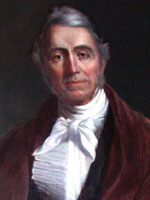The Anti-Masonic Party was the earliest third party in the United States. Formally a single-issue party, it strongly opposed Freemasonry in the United States. It was active from the late 1820s, especially in the Northeast, and later attempted to become a major party by expanding its platform to take positions on other issues. It declined quickly after 1832 as most members joined the new Whig Party; it disappeared after 1838.

The 1832 United States presidential election was the 12th quadrennial presidential election, held from Friday, November 2 to Wednesday, December 5, 1832. Incumbent president Andrew Jackson, candidate of the Democratic Party, defeated Henry Clay, candidate of the National Republican Party.
The National Republican Party, also known as the Anti-Jacksonian Party or simply Republicans, was a political party in the United States that evolved from a conservative-leaning faction of the Democratic-Republican Party that supported John Quincy Adams in the 1824 presidential election.

Marcus Morton was an American lawyer, jurist, and politician from Taunton, Massachusetts. He served two terms as Governor of Massachusetts and several months as Acting Governor following the death in 1825 of William Eustis. He served for 15 years as an associate justice of the Massachusetts Supreme Judicial Court, all the while running unsuccessfully as a Democrat for governor. He finally won the 1839 election, acquiring exactly the number of votes required for a majority win over Edward Everett. After losing the 1840 and 1841 elections, he was elected in a narrow victory in 1842.

Levi Lincoln Jr. was an American lawyer and politician from Worcester, Massachusetts. He was the 13th Governor of Massachusetts (1825–1834) and represented the state in the U.S. Congress (1834–1841). Lincoln's nine-year tenure as governor is the longest consecutive service in state history; only Michael Dukakis, John Hancock and Caleb Strong served more years, but they were not consecutive.
Samuel Lathrop was a U.S. Representative from Massachusetts.

The 1831 Connecticut gubernatorial election was held on April 8, 1831. Incumbent acting governor and National Republican nominee John S. Peters was elected to a term in his own right after the resignation of his predecessor Gideon Tomlinson, defeating Anti-Masonic nominee Zalmon Storrs with 68.75% of the vote.

The 1831 Vermont gubernatorial election took place in September and October, and resulted in the election of William A. Palmer to a one-year term as governor.

The 1838 Massachusetts gubernatorial election was held on November 12.

The 1836 Massachusetts gubernatorial election was held on November 14.

The 1835 Massachusetts gubernatorial election was held on November 9.

The 1834 Massachusetts gubernatorial election was held on November 10.

The 1832 Massachusetts gubernatorial election was held on November 12.

The 1830 Massachusetts gubernatorial election was held on April 5.
The first 1831 Massachusetts gubernatorial election was held on April 14.

The 1829 Massachusetts gubernatorial election was held on April 6.

The 1828 Massachusetts gubernatorial election was held on April 7.

The 1826 Massachusetts gubernatorial election was held on April 3.

The 1825 Massachusetts gubernatorial election was held on April 4.

The 1833–34 Massachusetts gubernatorial election consisted of a popular election held on November 11, 1833, that was followed by a legislative vote held in January 1834. The ultimate task of electing the governor had been placed before the Massachusetts General Court because no candidate received the majority of the vote that was constitutionally required for a candidate to be elected through the popular election.










